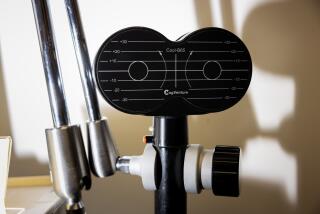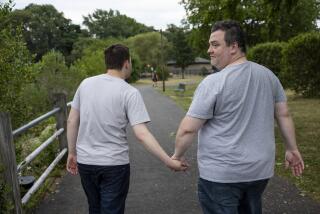Focusing the mind
- Share via
Some parents of children diagnosed with attention deficit disorder will try just about anything to avoid drug treatment -- homeopathy, chiropractic, massage, even faith healing.
“There’s a label, a stigma that goes with drug treatment,” said Dr. Regina Bussing, a child psychiatrist at the University of Florida who conducted a recent survey of 1,600 families in that state.
Although national statistics are not available, some doctors and other experts say that more than half of families coping with ADHD, or attention deficit hyperactivity disorder, now try alternatives before considering treatment with drugs, such as Ritalin or Adderall. The trend is on the rise, doctors say, as more children are diagnosed with attention problems and more ADHD products and programs crowd the marketplace. These include not only restrictive diets, vitamin and mineral supplements, but brain wave-measuring technology, and biofeedback.
Parents’ wariness of drug therapies is partly due to suspicions about the diagnosis of ADHD. There’s no single test for the condition, and doctors don’t always agree on the diagnosis. Nor are they sure how the standard treatment -- Ritalin, a powerful stimulant -- actually calms people and improves mental focus. “Many parents are worried about being ridiculed about it, by relatives or friends saying, ‘You better be careful, kids turn into zombies if they’re over-sedated,’ ” Bussing said.
The growing popularity of alternative treatments for ADHD may further confound the understanding of one of the most common diagnoses in child psychiatry. Because no one is tracking these families closely to see what alternatives are effective and in whom, nontraditional therapies remain largely untested. In the meantime, they can prevent families from considering proven therapies: drug treatment, which can help about 70% of children with ADHD, and family counseling, which improves symptoms in about 50% of them. The result, psychiatrists say: Many children may be getting worse as their parents sample treatments.
Dr. James McGough, director of ADHD programs at UCLA’s Neuropsychiatric Institute, is disturbed by the tendency of parents to discount drug treatment that has been shown to work. “The saddest cases I see are parents of sixth- or seventh-graders who are dejected about school, who want to drop out, who’re doing nothing but ride their skateboard -- and the parents say, ‘The doctor told us to try medication in third grade and we didn’t want to do it.’ ”
For only in recent years have researchers begun to evaluate nontraditional therapies in a scientifically rigorous way. “What you find is that the evidence for these alternatives ranges from fair to none at all,” said Dr. L. Eugene Arnold, professor emeritus of psychiatry at Ohio State University in Columbus, who recently reviewed studies of alternative therapies for ADHD. “I think people simply need to proceed with the understanding that, when it comes to alternatives, they’re experimenting.”
Among the popular alternatives that have been studied:
* Diet. The notion that food dyes, preservatives and other ingredients can cause mental problems in youngsters goes back some 50 years.
There is some evidence that children on so-called “elimination diets” may become more focused and settled. Such diets exclude processed and other foods thought to prompt allergic or other problematic reactions. A typical diet might include lamb, chicken, potatoes, rice and a variety of fruits and vegetables, such as apples, broccoli and celery.
In one widely cited study, researchers at the University of Alberta in Calgary found that an elimination diet improved behavior in 12 of 24 hyperactive preschool-age boys, according to their parents’ reports. The improvements were noticeable within the first month on the diet. In another, German researchers in 1997 found that 12 of 49 school-age children with ADHD showed similar improvements.
But overall, the studies have been small and not convincing to many doctors who treat attention problems.
Many other parents are reluctant to consider a program that may involve battle with a defiant, finicky eater over every meal. For them, imposing a diet could worsen already strained family relations.
But for those families who can manage a change in diet without drawn-out turmoil, some doctors say that well-balanced elimination regimens are at least worth a try, Arnold said. He estimates that 5% to 10% of children diagnosed with ADHD might respond. This group appears to include many preschoolers with allergies, irritability and sleep problems, according to Arnold.
Scientists have found no good evidence that another popular alternative treatment -- a dietary program that strictly limits artificial sugars -- is helpful.
* Supplementation. Over the years, researchers have examined blood samples of children diagnosed with attention or learning problems, looking for deficiencies in vitamins, minerals or other nutrients. The theory is that perhaps hyperactive, highly distractible children aren’t absorbing nutrients properly or may not be getting sufficient nutrition in their diets.
Some studies have picked up low levels of fatty acids, such as omega-3 and omega-6; others have discovered deficiencies in minerals, such as iron or zinc. Some children who take supplements to make up for a specific nutritional shortfall become noticeably more settled in school and at home, several small experiments have found. And now there are dozens of supplements marketed for attention and brain function, with names like Pedi-Active and Focus Factor.
Yet there’s little good evidence that supplement regimens help well-nourished children concentrate any better or longer, or improve in school. Typically, researchers say, supplements marketed for ADHD-like complaints include a list of ingredients that have each been linked to attention problems in some children. But no one knows how to identify children who might benefit, what doses they would need, or whether even then it would make a noticeable difference.
When it comes to large, “mega”-dosing of single nutrients -- another strategy that some alternative therapists favor -- there are real risks. In large doses, vitamin A, zinc and iron can all be toxic.
* Biofeedback. The idea behind biofeedback is that people can train themselves to focus more deeply and continuously by controlling the electrical activity in their own brain.
Using electroencephalogram, or EEG, technology, doctors have found in several studies that people with ADHD diagnoses tend to have a distinct, lower-frequency wave pattern in their frontal cortexes. By concentrating on patterns and mazes while receiving “neurofeedback” signals from an EEG, people can consciously alter the activity, inducing better focus, some researchers report. Biofeedback techniques have been used to treat ADHD for years, and there are more than 500 practitioners using the techniques, according to the International Society for Neuronal Regulation, a professional group. In two small experiments conducted in the last year, doctors reported that a 40-minute course of biofeedback each week improved symptoms significantly, in both children on Ritalin and those with ADHD who were not taking drugs. The treatment programs ranged between three months and a year.
“We’re seeing increased interest in neurofeedback right now,” said David Rabiner, a researcher at Duke University who operates a Web site, www.helpforadd.com, that tracks studies of alternative treatments. “We’re still in need of better studies but I think even some who are skeptical of the treatments would agree that the theory behind them makes some sense.”
The problem for parents is that there are no accepted standards or guidelines by which to evaluate the effectiveness of biofeedback treatments. Each doctor, psychologist or therapist has his or her own methods and machines. Some have children solve puzzles, or try to recognize patterns while tracking brain waves; others have them concentrate on a certain point on a video screen while attempting to focus; still others are marketing video machines for in-home use.
The cost of biofeedback therapy varies widely. Some clinics charge $50 to $100 a session, and recommend two or three sessions a week, and a total of 50 sessions or more. All that effort and attention may itself deliver a powerful placebo effect, some researchers say. Or deliver nothing at all. For all the promise of biofeedback, therapists still don’t know which methods work best, and for whom.
The most critical thing for parents who decide to try biofeedback therapies is to closely monitor their child’s behavior at home and at school -- and judge for themselves whether it’s worth the money and time, Rabiner said. “You can’t overemphasize how important it is to systematically monitor how well your child is doing,” he said. “If the child is getting on track -- and particularly following class rules and doing good and consistent academic work -- that’s the most important thing.”
For Dana Walth, a 19-year-old college student in Des Moines, the answer was none of the above. Dreamy, restless, unable to concentrate for more than a few minutes at a time, Walth was diagnosed with ADHD when she was a sophomore in high school. Against the advice of school counselors, she refused to go on medication. “I just didn’t know how it would affect my personality,” she said. “I didn’t want to change; I wanted to be who I am.”
Instead of worrying about brain waves or food preservatives, she eliminated almost any free time from her daily schedule. She scheduled herself from 7 a.m. to bedtime: dance practice, cheerleading, choir, volunteer activities and various athletic and scholastic competitions.
Children with attention problems sometimes thrive on a headlong rush of activity. Walth’s grades improved after she began doing homework in 15- to 30-minute gasps, between practices, between classes, before and after dinner. “It’s the only way I could do the work,” she said. “I’d end up doing about three hours of studying a day, but always broken up; if I gave myself an hour or more, I’d stop. I’d procrastinate, and I’d lose focus.”
Working with her parents, she set daily goals, made use of lists and bulletin boards, set deadlines. In effect, the Walths successfully carried out a program of behavioral therapy. In scores of rigorous studies, doctors have found that intensive use of goal setting, organizing skills and time management can help 30% to 50% of children with attention problems do better in school and at home.
This approach can be as exhausting and disruptive to a family as imposing a strict diet, therapists say. “We didn’t have to rely on a pill,” said Laura Walth, Dana’s mother, who leads a support group for other families dealing with ADHD. “But at the same time, we knew it was out there, we saw the advantages, and I just tell people to try to be open-minded. You do what it takes.”
*
(BEGIN TEXT OF INFOBOX)
Alternative treatments for ADHD
The only proven treatments for ADHD are medications, such as Ritalin, and behavioral therapy. Nonetheless, parents of children who have the condition often turn to nontraditional approaches, ranging from restrictive diets and biofeedback to faith healing and acupuncture.
*
Treatment: Restrictive diets
Theory of cause: Food or additive sensitivity
Risks: Delay effective therapy
Comment: Some studies show benefit
*
Treatment: No-sugar diet
Theory of cause: Sugar malaise
Risks: Delay effective therapy
Comment: No evidence
*
Treatment: Amino-acid supplements
Theory of cause: Nutrient deficiency
Risks: Nerve, muscle damage
Comment: No evidence
*
Treatment: Fatty-acid supplements
Theory of cause: Nutrient deficiency
Risks: High doses may have side effects
Comment: Promising; still lacking good trials
*
Treatment: Vitamins
Theory of cause: Nutrient deficiency
Risks: High doses may cause liver damage
Comment: No good evidence
*
Treatment: Iron supplements
Theory of cause: Nutrient deficiency
Risks: Blood toxicity at high dose supplement
Comment: Some good data, but not yet confirmed
*
Treatment: Zinc supplements
Theory of cause: Mineral deficiency
Risks: White blood cell damage at high dose
Comment: Promising preliminary data
*
Treatment: Biofeedback
Theory of cause: Brain-wave difficulty
Risks: Expense, time
Comment: Promising but lacking scientifically rigorous trials
*
Source: L. Eugene Arnold, Ohio State University






